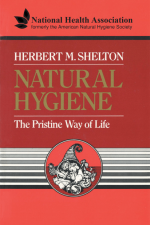
Herbert Shelton’s Revival of Living Nutrition
Knowledge & Practice
A Guide to Living Food & Evolved Health Principles & Protocols
Herbert M. Shelton (1895–1985) was a pioneer in the Natural Hygiene movement, a philosophy that promoted health through adherence to natural laws, emphasizing raw and living foods as the foundation of sustained functional health and longevity. Shelton’s work inspired a wave of health-conscious living that continues to influence advocates of raw fruit-based living food diets and holistic health practices today.
Core Principles of Herbert Shelton's Living Nutrition Philosophy
Adherence to Natural Laws: Shelton believed that the body is inherently self-healing when provided with the right conditions. He emphasized living in harmony with nature’s laws, including proper nutrition, rest, and emotional balance.
Emphasis on Raw and Living Foods: Central to Shelton’s philosophy was the idea that raw, unprocessed plant foods—such as fruits, soft leafy greens, nuts and seeds—are the most suitable for human consumption. He argued that cooking destroys essential nutrients and enzymes, diminishing the vitality of food.
Food Combining: Shelton popularized the concept of food combining, a practice that organizes meals based on digestive compatibility. He proposed that certain food combinations, such as starches and proteins, impede digestion and lead to poor health.
Simplicity and Moderation: Shelton advocated for simplicity in diet, promoting mono meals (eating one type of food at a time) to enhance digestion and reduce strain on the body. Moderation was another key principle, as overeating was seen as a primary cause of disease.
Hydration and Cleanliness: Proper hydration through fresh, clean water and the consumption of water-rich foods was emphasized. Additionally, Shelton stressed internal cleanliness, advocating for regular fasting to detoxify the body.
Natural Hygiene Diet & Lifestyle Protocols
Raw Food Diet:
-
- Fruits as Staple Foods: Shelton viewed fruits as nature’s perfect food, providing hydration, nutrients, and energy. He encouraged consuming fruits in abundance.
- Green Vegetables: leafy greens were considered essential for their mineral content and alkalizing properties.
-
Nuts and Seeds: In moderation, Macadamias, Walnuts, Almonds & Brazil nuts were valued for their healthy fats and protein content.
Fasting for Health: Shelton was a staunch advocate of fasting as a means of rejuvenation and detoxification. He oversaw numerous therapeutic fasting programs, asserting that abstinence from food allows the body to focus on healing and repair.
Sunlight and Fresh Air: He recognized the importance of environmental factors, advocating for exposure to natural sunlight and fresh air to enhance vitality.
Rest and Sleep: Shelton believed that proper rest was as crucial as nutrition. He emphasized the body’s need for sufficient sleep and periods of inactivity to recover and maintain good mental and physical health.
Physical Activity: Moderate, consistent exercise such as gardening – growing clean-green organic food in Kitchen Gardens and permanent agriculture Food Forests, was recommended to complement the raw food lifestyle, promoting circulation and overall health.
Shelton's Approach to Living Nutrition
Mono Meals
- Shelton proposed eating only one type of food per meal to simplify digestion and maximize nutrient absorption. For instance, a meal could consist solely of a large quantity of mangoes, watermelon or bananas
Seasonal Eating
- Eating foods that are in season and locally grown was emphasized, aligning with Shelton’s belief in living harmoniously with nature
Avoiding Processed Foods
- Refined sugars, flours, and other processed products were strictly avoided, as Shelton viewed them as antithetical to health
Digestive Efficiency
- Shelton stressed the importance of chewing food thoroughly to aid digestion and ensure proper assimilation of nutrients
Foundational Scientific & Philosophical Principles & Practices
Shelton’s approach was rooted in the philosophy of Natural Hygiene, which holds that the body is self-regulating and self-healing. He believed that disease arises from violations of natural laws, such as poor diet, lack of exercise, and stress. Rather than treating symptoms, Shelton’s protocols focused on removing the causes of disease by creating conditions conducive to health.
He also drew inspiration from earlier natural health advocates like Sylvester Graham and Dr. Isaac Jennings, expanding their ideas into a comprehensive system of health.
Criticism & Legacy
While Shelton’s ideas garnered a devoted following, they were not without criticism. Medical professionals often challenged his lack of formal medical training and some of his more controversial practices, such as extended fasting. Despite this, his influence remains profound within the raw food and natural health movements.
Today, Shelton’s principles continue to inspire practitioners of raw veganism, holistic nutrition, and natural health. His emphasis on living foods as a pathway to vitality resonates with contemporary movements advocating for sustainability, wellness, and ethical eating.
Practical Application of Shelton's Teachings Today
Incorporating More Raw Foods: Start by adding more fresh fruits and vegetables to your diet, aiming for meals that are predominantly raw.
Practicing Food Combining: Experiment with Shelton’s food combining principles to see if they improve your digestion.
Exploring Fasting: Consider short periods of intermittent fasting or juice fasting to support detoxification and reset your system.
Living in Harmony with Nature: Prioritize outdoor activities, sunlight, and fresh air as part of your daily routine.
Simplifying Meals: Embrace simplicity by preparing mono meals or focusing on a few wholesome ingredients per dish.
Herbert M. Shelton’s legacy endures as a testament to the power of natural living and the transformative potential of raw, living foods. His work invites us to reconnect with nature’s wisdom, honoring the innate intelligence of our bodies and the nourishment that comes from the earth.
Limits of Shelton's Knowledge
& Nutritional Gaps
For those considering the adoption of Ostroveganism which means the inclusion of Mollusks in the form of raw mussels and oysters grown and harvested from pristine seas, it will be of worthy note that Shelton suffered from Parkinson’s Disease – a progressive neurological disorder that affects movement, muscle control, and coordination, often leading to tremors, stiffness, and severe impairment of speech and mobility for 13 years prior to his death aged 77.
Despite many attempts he was unable to improve his own health, which shocked and saddened his peers and friends to see him bedridden, unable to walk, speak normally, or write in his 60’s.
With what the vegan movement now understands about the critical need for assimilable sources of B12, iodine, magnesium, and selenium—nutrients abundantly available from the sea and free from land-based deficiencies—perhaps he could have been spared such immense suffering and avoided an untimely death.

